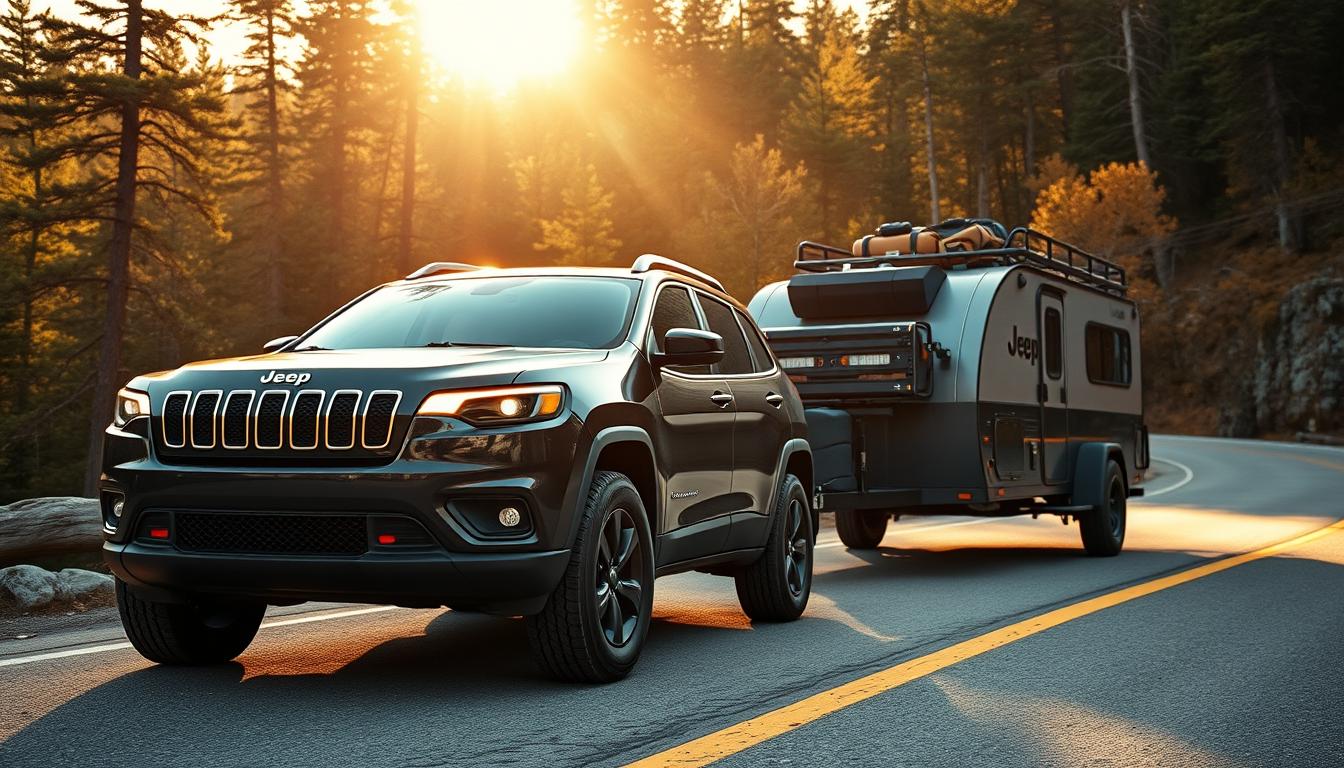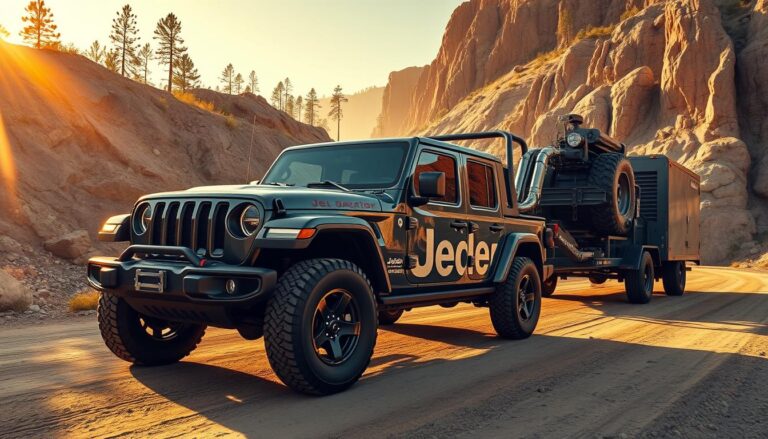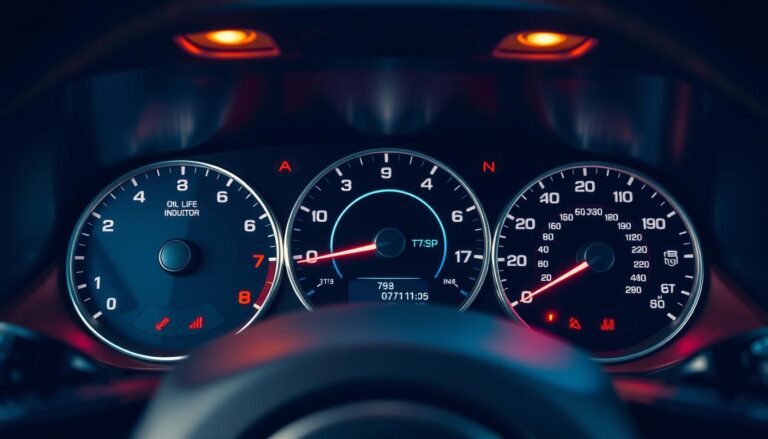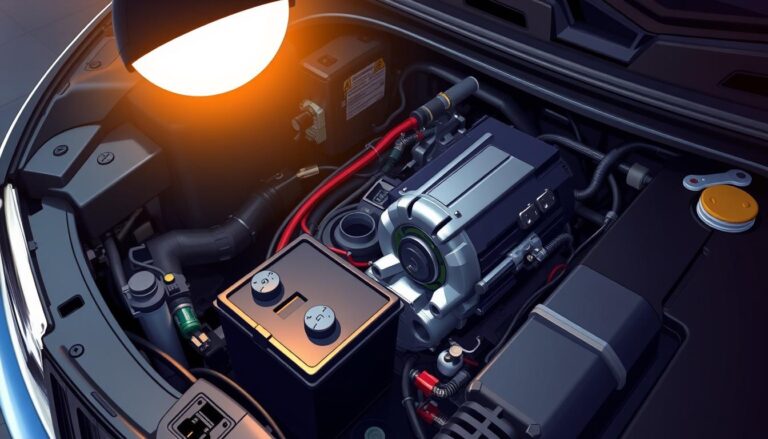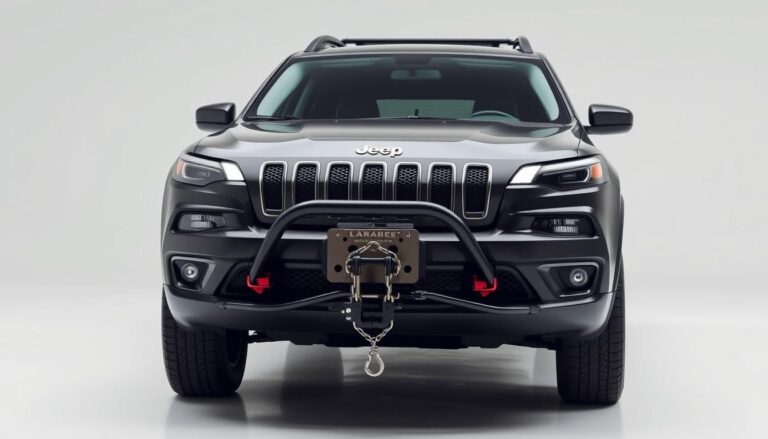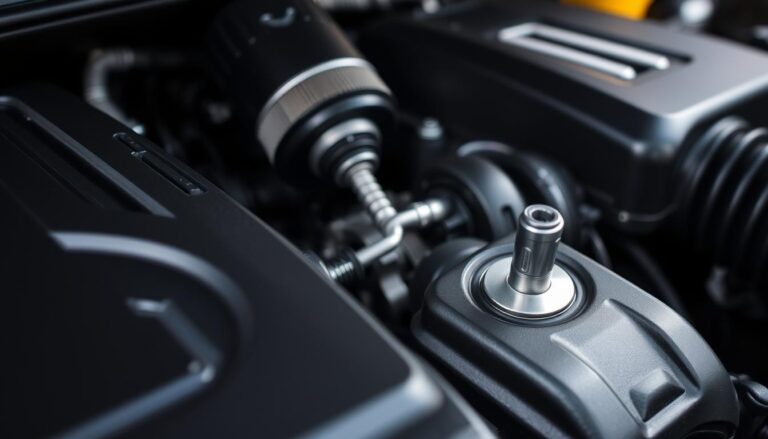Maximize Your Jeep Cherokee’s Towing Potential
The Jeep Cherokee combines style with power. But understanding its towing specs and boosting its performance is key. In this guide, we share critical Jeep Cherokee hauling tips. These will help you optimize your Jeep Cherokee towing experience. With the right know-how and adjustments, every towing trip can be both safe and efficient.
Are you planning a getaway or need to transport equipment? Knowing your Jeep Cherokee’s specs and features is essential. We’ll walk you through factory specs, key upgrades, and best practices. This will fully unlock your vehicle’s capabilities.
Now, let’s deeply explore how to optimize your Jeep Cherokee towing experience. We’ll emphasize the best practices for safe and efficient towing.
Understanding Jeep Cherokee Pulling Capacity
The Jeep Cherokee is well-known for its towing power. Understanding what affects its pulling capacity is key. “Pulling capacity” means the most a vehicle can tow, like trailers and cargo.
The towing power of a Jeep Cherokee depends on its engine type, drivetrain, and how it’s set up. It has strong engines, from the 2.4L Tigershark® MultiAir® 2 to the 3.2L Pentastar® V6, for different towing needs.
The kind of drivetrain it has is crucial too, from front-wheel to four-wheel drive, for better grip and stability. Also, its versions, such as Trailhawk® and Limited, offer various towing abilities for different needs.
Other key things that affect towing are towing packages. They have better cooling systems, stronger brakes, and special hitches. Knowing about these can help pick the best Jeep Cherokee setup for towing, making it safe and efficient.
A Detailed Look at the Jeep Cherokee Towing Specs
The *Jeep Cherokee*, known for both its adaptability and strong structure, offers various towing capabilities. These depend on the model year and unique setups. For those looking for the top towing capacity the Jeep Cherokee can offer, knowing the exact specs is key.
The *jeep cherokee towing capacity* changes a lot between the models and years. It’s vital for buyers to look closely at each option:
| Model Year | Engine Type | Maximum Towing Capacity (lbs) |
|---|---|---|
| 2022 | 3.2L Pentastar V6 | 4,500 |
| 2021 | 2.0L Turbo I4 | 4,000 |
| 2020 | 3.2L Pentastar V6 | 4,500 |
| 2019 | 2.4L Tigershark MultiAir I4 | 2,000 |
Several key factors affect the Jeep Cherokee’s towing ability. They ensure it is versatile and reliable for different needs:
- Engine Power: The engine’s strength, measured by horsepower and torque, plays a major role in how well it can tow. The 3.2L Pentastar V6 is at the top for power and efficiency.
- Transmission: A well-tuned 9-speed automatic transmission helps in controlling speed and torque accurately.
- Chassis Strength: The Cherokee’s sturdy frame supports stability and the ability to carry heavy loads.
- Suspension System: Advanced suspension setups assist in balancing weight and keeping the ride smooth while towing.
To pick the best *towing capacity for Jeep Cherokee*, knowing these details is crucial. Whether you need to tow a trailer for fun or carry loads for work, the right choice based on these specs will ensure top performance and safety.
How to Calculate Tow Capacity for Your Jeep Cherokee
Knowing how to calculate tow capacity for your Jeep Cherokee is key. It’s about safety and towing without issues. Look at the factory specs and understand the difference between payload and towing capacity. This tells you what your Jeep can handle.
Factory Specifications
First, look at your Jeep Cherokee’s factory specs. These specs show the max tow capacity and other important details. The tow capacity Jeep Cherokee depends on engine size, drivetrain, and brakes.
| Model | Engine Type | Max Tow Capacity (lbs) |
|---|---|---|
| Cherokee Latitude | 2.4L I4 | 2000 |
| Cherokee Limited | 3.2L V6 | 4500 |
| Cherokee Trailhawk | 3.2L V6 | 4500 |
Payload vs. Towing Capacity
Payload and towing capacity are not the same. Payload is about the weight inside the vehicle. Towing capacity is the max weight the Jeep can tow. The Jeep Cherokee towing specs give you the numbers.
To calculate your Jeep’s tow capacity, follow these steps:
- Check the owner’s manual for exact numbers.
- Subtract the weight of passengers and cargo from the payload capacity.
- Make sure your trailer and its load don’t exceed the Jeep’s tow limit.
By following these guidelines, you can make the most of your Jeep Cherokee’s towing power safely.
Choosing the Right Hitch for Maximum Towing Performance
Choosing the right hitch is key to getting the best towing performance from your Jeep Cherokee. There are different types of hitches to meet various towing needs. Knowing the types helps you pick wisely.
Consider two main hitch categories for your vehicle:
- Weight-Carrying Hitches: Ideal for light loads up to 3,500 pounds. They support the trailer’s weight on the vehicle’s rear axle. They’re great for towing small boats or light trailers affordably and simply.
- Weight-Distributing Hitches: Necessary for heavier loads. They spread out the trailer’s weight across all axles, offering better stability and control. This is best for those who want to use the Jeep Cherokee’s full towing ability, especially with large trailers or heavy loads.
It’s crucial to match the hitch rating with your Jeep Cherokee’s towing capacity. This keeps you safe and ensures the best performance. Here’s a guide to help identify the right hitch for your needs:
| Hitch Type | Towing Capacity | Best Use |
|---|---|---|
| Weight-Carrying | Up to 3,500 lbs | Light trailers, small boats |
| Weight-Distributing | Up to 7,200 lbs | Travel trailers, heavy equipment |
Picking the right towing hitch is crucial for top Jeep Cherokee towing results. Double-check that the hitch fits your Jeep’s specs and the trailer’s gross weight. This keeps you safe and efficient on the road.
Finally, pick the hitch type that meets your towing requirements. The right equipment lets you tap into the Jeep Cherokee’s towing potential. Plus, it guarantees a safe, smooth towing journey.
Essential Upgrades for Enhancing Haul Capacity
Want to boost your Jeep Cherokee’s hauling power? It’s key to focus on towing upgrades. Improving your car’s suspension and brakes makes towing safer and steadier.
Suspension Upgrades
For better towing, the suspension system is crucial. With the right upgrades, your car will handle and stay stable under heavy loads. For Jeep Cherokees, here are some top choices:
- Heavy-Duty Shocks and Struts: These manage the extra weight and stress from towing for a smoother journey.
- Load-Leveling Kits: These keep your car balanced during hauls, improving handling and control.
- Air Suspension Systems: Adjustable for different towing weights, these systems offer better load management.
Boosting your suspension can seriously upgrade your Jeep Cherokee’s hauling ability. It makes towing heavy trailers and loads easier.
Brake Enhancements
For towing safely, strong brakes are a must. They need to work well, especially with extra weight. Consider these brake upgrades for better performance:
- Performance Brake Pads: These handle heat better and improve how quickly you stop.
- Upgraded Rotors: Slotted or drilled rotors help your brakes work better under stress.
- Brake Controllers: These electronics give you more control over your trailer’s brakes for safer hauling.
Adding these brake upgrades ensures your Jeep Cherokee stays safe and dependable for towing.
Planning upgrades for towing? Focusing on both suspension and brake systems is essential for the best hauling performance.
Best Practices for Safe Towing
Towing a trailer with your Jeep Cherokee can go smoothly if you do it right. It’s very important to stick to certain practices. These practices help your vehicle tow more effectively and safely.
Proper Weight Distribution
Getting the weight distribution right is crucial for safe towing. If the weight is uneven, your Jeep Cherokee might sway and become hard to steer. You should spread the load out evenly. Make sure to put heavier items closer to your vehicle and balance both sides of the trailer.
This improves how well you can control and stabilize your towing setup.
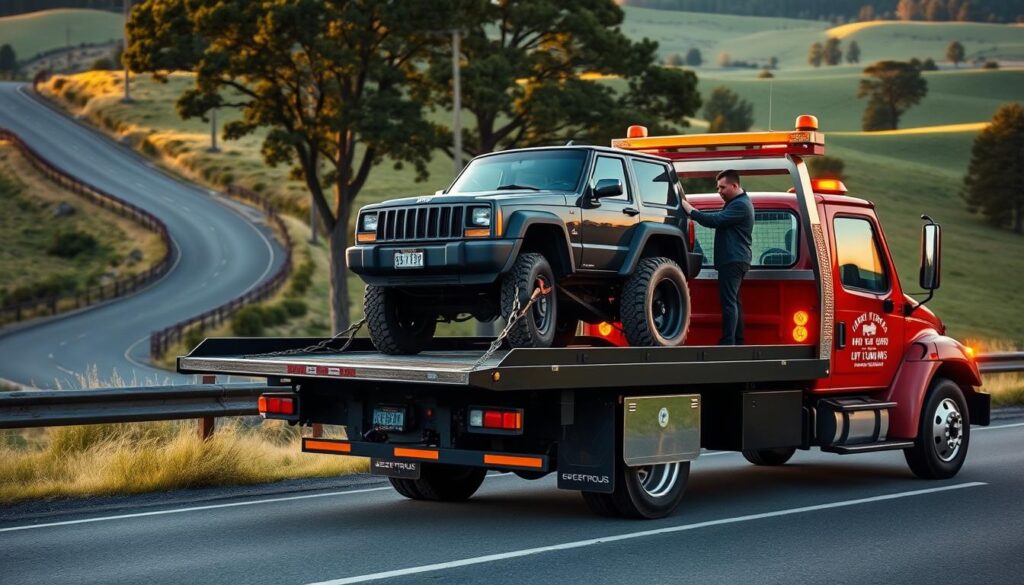
Speed and Driving Techniques
The way you drive and your speed are very important when towing. Keep your speed down to stay in control and stop safely when needed. Avoid sudden moves to keep the trailer from swaying. Always be extra careful, especially when turning or going down slopes.
By following these tips, towing with your Jeep Cherokee will be safer and more fun.
Jeep Cherokee Trailer Weight Limit: What You Need to Know
Knowing the Jeep Cherokee trailer weight limit is crucial for a safe and effective towing experience. The Jeep Cherokee is known for its capability and power, with specific trailer weight limits for each model and engine type.
The trailer weight limit for the Jeep Cherokee can be between 2,000 and 4,500 pounds. Models with the 2.4L Tigershark engine generally tow less than those with the 3.2L Pentastar engine.
| Engine Type | Maximum Towing Capacity (pounds) |
|---|---|
| 2.4L Tigershark | 2,000 |
| 3.2L Pentastar V6 | 4,500 |
It’s important to follow the towing restrictions. Overloading can cause big problems and dangers. Always make sure your load does not exceed the limit for a safe journey.
To keep your vehicle and passengers safe, remember to:
- Check your hitch and towing gear regularly.
- Spread out the weight in your trailer evenly.
- Stick to the max towing capacity without going over.
By understanding the Jeep Cherokee trailer weight limit, you help ensure your vehicle lasts longer and keeps everyone safe. For accurate towing details, always look at your vehicle’s manual and follow any specific towing restrictions of your state.
Maximize Tow Performance: Regular Maintenance Tips
Keeping your Jeep Cherokee in great shape is key to its towing ability. Regular checks on important parts make sure your vehicle can handle heavy loads well. Focus on the engine, transmission, tires, and brakes for the best results.
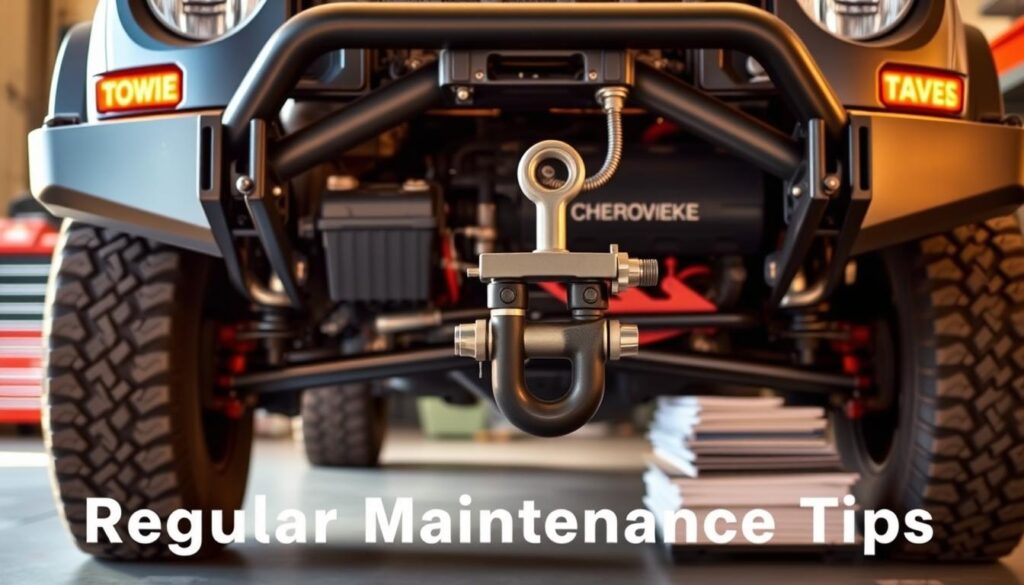
Engine and Transmission Care
The engine and transmission are vital for your Jeep Cherokee’s towing power. Changing the oil often and keeping an eye on fluid levels are crucial steps. Use top-notch engine oil suited for heavy use and think about getting a transmission cooler for frequent towing.
- Regular oil and filter changes
- Check and top-off transmission fluid
- Consider installing a transmission cooler
Tire and Brake Maintenance
Good tires and brakes are essential for safe towing with your Jeep Cherokee. The right tire pressure and tread depth help with stability and control. High-quality brake pads and rotors offer the stopping power needed for big loads.
- Inspect tire pressure and tread depth
- Use high-quality, durable tires
- Upgrade to performance brake pads and rotors
- Routinely check and replace brake fluid
Follow these tips to keep your Jeep Cherokee ready for towing. Checking things regularly and making upgrades as needed will boost your confidence in handling heavy loads. This keeps your vehicle safe, reliable, and at peak performance for towing.
Legal Considerations When Towing with Your Jeep Cherokee
When you tow with your Jeep Cherokee, it’s vital to know towing laws. This helps you avoid problems and stay safe on the road.
First off, know your state’s weight limits for vehicles and trailers. Not following these can lead to big fines or even your vehicle being taken away. Always check the gross vehicle weight (GVW) your state allows and stick to it.
Also, you might need a special license to tow with your Jeep Cherokee. This depends on how heavy your Jeep and trailer together are. Sometimes, you might need a commercial driver’s license (CDL) or a special towing license. It’s smart to check with the DMV to see what you need.
Make sure your towing gear is up to code, too. Your hitch, safety chains, and brakes must meet state laws. Using the right hitch and chains rated for your load matters a lot. Before hitting the road, always check that everything is hooked up right.
- Verify the weight limits imposed by state laws
- Check if a special license or endorsement is required
- Ensure towing equipment meets regulatory standards
In short, knowing and following towing laws keeps you and your cargo safe. Always look up your state’s rules to make sure you’re doing everything right.
Real-World Experiences: Jeep Cherokee Owners Share Their Towing Tips
Hearing from Jeep Cherokee owners about towing can be super helpful. They’ve faced many towing challenges and found ways to solve them. Their advice can help you dodge common issues and make towing with your Jeep better.
Common Challenges
A lot of Jeep Cherokee owners talk about the same towing troubles. These problems include:
- Overloading: Carrying too much can overwork the engine and transmission.
- Braking difficulties: With more weight, you need better brakes.
- Trailer sway: Not spreading out the weight right can make your trailer unstable, especially when driving fast.
- Heat management: Towing for a long time can make the engine and transmission too hot.
Owner-Recommended Solutions
Jeep Cherokee owners have found good ways to fix these towing issues:
- Weight Management: Always check and adjust your trailer’s load for safer towing. Use distribution hitches to balance the weight better.
- Brake Upgrades: Better brake pads can help, and adding a trailer brake controller makes managing extra weight easier.
- Cooling Systems: Adding extra coolers for the transmission helps keep it from getting too hot on long trips.
- Regular Maintenance: Keeping up with your engine and transmission maintenance helps a lot.
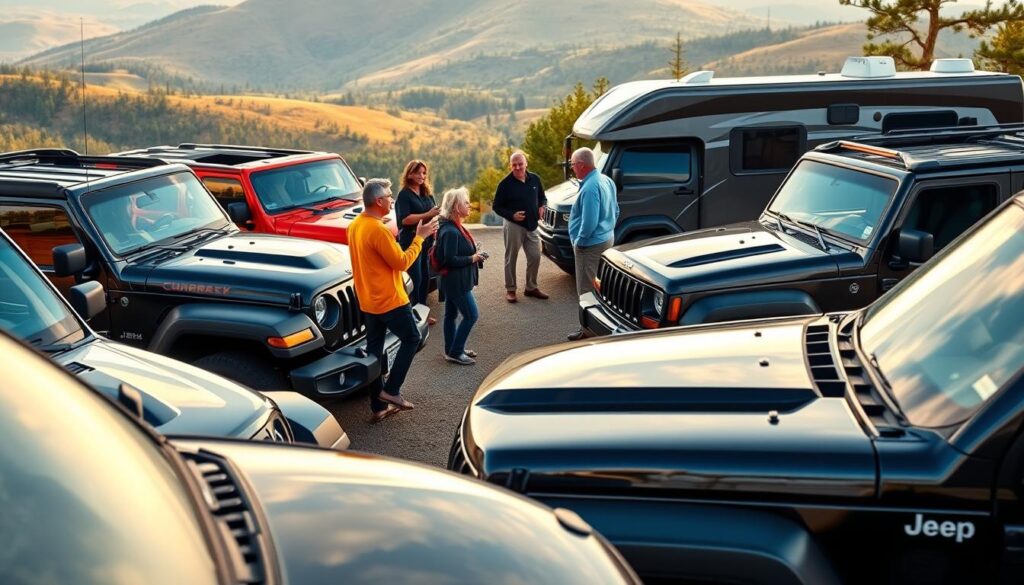
Using real advice from Jeep Cherokee owners helps keep your vehicle ready for towing. Follow these tips for smoother, safer towing adventures.
Conclusion
To make the most out of your Jeep Cherokee’s towing abilities, a few steps are key. First, know the towing capacity of your Jeep Cherokee. This is vital for both safety and efficiency when towing. Look at the vehicle’s specs and distinguish between payload and towing capacity. This knowledge is a must for Jeep Cherokee owners wanting to boost their vehicle’s hauling power.
Next, picking the right hitch and making upgrades can improve your Jeep Cherokee’s performance. It’s also vital to practice safe towing. This means keeping the weight balanced and following the best speed and driving tips. Also, following the law is important to stay safe and avoid fines.
Finally, regular maintenance is crucial, focusing on the engine, transmission, and the care of tires and brakes. Learning from other Jeep Cherokee owners can offer new ways to handle towing issues. With these detailed steps and advice, you’re set to enhance your Jeep Cherokee towing safely and effectively.

